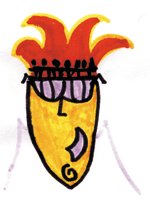Chance UK mentoring programmes are designed to achieve
the following outcomes for children :
- encourage
wider range of behavioural options
- build
confidence, self-esteem, self-image & self-control
- increased
social awareness and improved relationships
- enhanced
life skills, resiliency & cognitive abilities
- increase
individual & family protective factors
- decreased
risk of school/social exclusion, antisocial behaviour
& criminal offending
|
Alongside the benefits for those participating directly
in the programme, the costs can also be regarded as an investment
for education and future employment, with an associated
contribution of taxes and national insurance, against the
potential of the very much higher costs of later statutory
interventions, state benefits, health costs, criminality
and youth justice interventions.
- SDQ
scores - baseline& outcome : referrer, parent & mentor
- Educational
Assessment : SAT/Teacher assessment scores, reading
ages, attendance & exclusion
The qualitative measures include :
- Interviews
: referrer, parent, mentor & child
- goals
of mentoring
- documented
supervision sessions, mentoring session plans and reviews
- evaluation
of mentor training
Chance UKis in the process of identifying mechanisms and
resources for longer term follow up of the children to ascertain
long term impact. Some of the follow up may continue for
up to five years from the end of mentoring.
Chance UKhas built upon independent evaluations carried
out by :
- National
Children's Bureau evaluation in 1996
- Thomas
Coram Research Unit of the Institute of Education (commissioned
by the Home Office) from 1998-2000
The latter addressed the implementation of the mentoring
programme and assessed immediate outcomes for the children
in terms of changes in overall and individual SDQ scores
and behaviour. Two groups of 25 children each were assessed.
One group consisted of those who participated in the mentoring
programme and the other group was a 'comparison or control'
group of children with comparable problems who did not participate
in the mentoring programme. Of the mothers interviewed,
75% saw positive changes in their child's behaviour; 81%
saw the mentor as a good influence; and, 69% reported benefits
for their own relationship with the child. All the mentors
and teachers interviewed saw positive changes. The schools
hold Chance UKin very high regard and also value the professionalism,
accessibility and rapid response of our staff. A summary
of the Research
Findings is available on the Resources
page.
The findings were underpinned by some of the comments from
the children themselves on their relationship with their
mentor:
"She
makes thing better; shows me the way to find the answer".
"I've
learned to control my feelings; not to get into a tantrum.
She teaches me to count to ten."
"She
helps me to get on with work and finish it; not to be rude
to teacher; not to shout out; to put up my hand. I can talk
to teacher now. She talks to my teacher."
"She
explains the consequences. I've learned to deal with disappointments."









